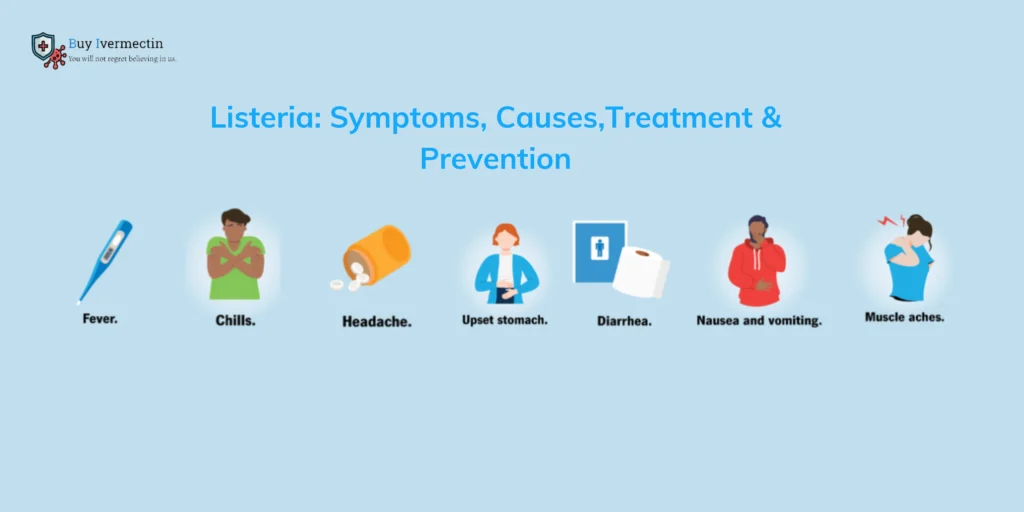Table of Contents
ToggleListeria Symptoms
Listeria symptoms is a serious infection caused by eating food contaminated with the bacterium Listeria monocytogenes. Though it is relatively rare, it can lead to severe illness, especially in vulnerable populations such as pregnant women, newborns, older adults, and individuals with weakened immune systems. This blog will delve into the key aspects of listeriosis, from its symptoms and diagnosis to treatment and prevention.
What is Listeriosis?
Listeriosis is an infection caused by the bacterium Listeria monocytogenes. This bacterium is found in soil, water, and some animals, including cattle and poultry. Unlike many other bacteria, Listeria can grow at refrigeration temperatures, making it a significant concern in food safety. The infection primarily affects people who consume contaminated food products, such as dairy products, vegetables, and meats.
Who Does Listeriosis Affect?
Listeriosis can affect anyone who consumes contaminated food, but certain groups are at higher risk:
- Pregnant Women: Pregnant individuals are about 10 times more likely to get listeriosis than the general population. The infection can lead to miscarriage, stillbirth, or severe illness in newborns.
- Newborns: Infants can acquire the infection from their mothers during pregnancy or delivery, leading to serious health complications.
- Older Adults: People aged 65 and older are more susceptible to severe listeriosis.
- Individuals with Weakened Immune Systems: Those with conditions such as cancer, diabetes, HIV/AIDS, or those on immunosuppressive medications are at higher risk.
How Common is Listeria?
Listeriosis is relatively rare compared to other foodborne illnesses. In the United States, about 1,600 people get listeriosis each year, and about 260 die from it. However, because it can lead to severe outcomes in high-risk groups, it remains a significant public health concern.
What are the listeria symptoms?
Listeria symptoms can vary depending on the person and the part of the body affected. Common symptoms include:
- Fever
- Muscle aches
- Nausea or diarrhea
If the infection spreads to the nervous system, symptoms may include:
- Headache
- Stiff neck
- Confusion
- Loss of balance
- Convulsions
What are the Symptoms of Listeriosis in Pregnant People?
Pregnant individuals may experience mild flu-like symptoms, such as fever, muscle aches, and fatigue. However, the infection can have severe consequences for the fetus, including:
- Miscarriage
- Stillbirth
- Premature delivery
- Life-threatening infection in the newborn
How Do You Get Listeriosis?
Listeriosis is typically contracted by eating food contaminated with Listeria monocytogenes. Common sources include:
- Unpasteurized dairy products
- Soft cheeses
- Ready-to-eat deli meats and hot dogs
- Refrigerated smoked seafood
- Raw sprouts
Cross-contamination in the kitchen, where bacteria from raw food spreads to ready-to-eat food, can also be a cause.
Diagnosis and Tests
How Do You Know if You Have Listeriosis?
Diagnosing listeriosis typically involves a blood test or a spinal fluid test to detect the presence of Listeria monocytogenes. If you experience symptoms and are in a high-risk group, it’s crucial to seek medical attention promptly. Early diagnosis and treatment can significantly improve outcomes.
Management and Treatment
What are the Side Effects of Antibiotics?
Listeriosis is treated with antibiotics. The type of antibiotic and duration of treatment depend on the severity of the infection and the patient’s overall health. Common antibiotics used include ampicillin and gentamicin.
Side effects of antibiotics can include:
- Nausea
- Diarrhea
- Allergic reactions
- Yeast infections
It’s essential to complete the prescribed antibiotic course even if symptoms improve, to ensure the infection is fully eradicated.
How Do I Manage My Symptoms?
Managing listeria symptoms involves following medical advice and taking prescribed medications. Additional measures include:
- Rest: Adequate rest can help the body recover more effectively.
- Hydration: Drinking plenty of fluids is crucial, especially if experiencing diarrhea or fever.
- Nutritional Support: Maintaining a balanced diet can support immune function and overall health.
Prevention
Preventing listeriosis involves food safety practices, especially for high-risk groups. Key preventive measures include:
- Proper Food Handling: Wash hands, utensils, and food preparation surfaces frequently. Avoid cross-contamination by using separate cutting boards for raw meat and other foods.
- Safe Food Storage: Refrigerate perishable foods promptly and keep the refrigerator at or below 40°F (4°C).
- Avoid High-Risk Foods: High-risk individuals should avoid unpasteurized dairy products, certain soft cheeses, and ready-to-eat deli meats unless heated to steaming hot.
What Can I Expect if I Have Listeriosis?
If you have listeriosis, the prognosis depends on several factors, including the severity of the infection, your overall health, and how quickly you receive treatment. Most people with mild symptoms recover fully with appropriate antibiotic treatment. However, severe cases, especially those involving the nervous system or affecting high-risk groups, can be more complicated and require extended medical care.
Conclusion
Listeriosis, while rare, is a serious infection that can lead to severe health complications, particularly for pregnant women, newborns, older adults, and those with weakened immune systems. Understanding the symptoms, risk factors, and preventive measures is crucial for minimizing the risk of infection. If you suspect you have listeriosis or are in a high-risk group, seeking prompt medical attention and adhering to food safety guidelines can significantly improve outcomes. Stay informed, practice safe food handling, and prioritize your health to protect yourself and your loved ones from this potentially dangerous infection.




